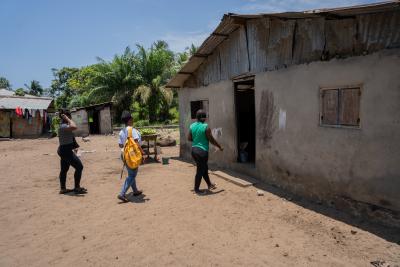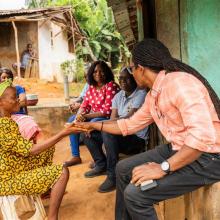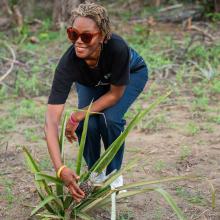Community Health

PIH Liberia strengthens health systems in Maryland County through community programs, surveillance, and socioeconomic support—improving access, reducing disease burden, and advancing health equity for 30,000+ people across TB, HIV, NCDs, maternal health, and more.
Our Impact
PIH Liberia’s Community Health Promoter program boosts access to care for rural communities by linking patients to services and advancing Universal Health Coverage in Maryland County.
-
107,780+Home Visits
conducted by community health workers in 2024
-
260+PIH-Supported
community health workers in Liberia in 2024
-
56,680+Outpatient Visits
recorded in 2024.

L-R: Love S. Davis, a member of the Community Health Committee; Caroline A. Doe, a community health nurse; and Bentina Walloh, a community health promoter with the Maryland County Health Team. The health workers went door-to-door to raise awareness and conduct TB contact tracing during the World TB Day and Global Health Justice Week celebrations.
In 2018, Partners In Health Liberia (PIH-L), through the Ministry of Health (MOH), established the Community Health Promoter (CHP) program to cater to populations living within 5 kilometers of health facilities. The aim was to facilitate progress toward Universal Health Coverage (UHC) in Maryland County by offering non-clinical services focusing on referrals rather than diagnosis or treatment. This initiative successfully boosted the utilization of health care services and helped bridge health equity gaps for the most vulnerable communities in Liberia.
The pilot phase of the CHP program took place from 2019 to 2020, involving 49 CHPs, five CHP supervisors, and one community health nurse (CHN). During this period, they linked 3,177 individuals to care. A significant portion, 24.4%, of these cases involved common childhood illnesses under five, such as malaria, diarrhea, and acute respiratory infections, including pneumonia. For adults, malaria accounted for the highest rate of referrals at 18.5%.
These findings align with national statistics that identify malaria as a leading cause of morbidity and mortality in Liberia, accounting for 42% of outpatient visits and 33% of inpatient deaths. Following the pilot, from 2020 to 2024, the program expanded to all 28 communities in Harper District, Maryland. This phase involved training and deploying 162 CHPs, 16 CHP Supervisors, and 3 Community Health Nurses (CHNs) who provided services to 6,487 households, impacting 31,535 individuals and conducting 32,421 household visits. Throughout this expansion, they successfully linked 13,579 patients. They offered support for 88363 chronically ill patients across various health conditions, including TB, HIV, measles, non-communicable diseases (NCDs), malnutrition, leprosy, mental health concerns, and maternal and child health issues.
This intervention significantly mitigates the burden of TB, HIV/AIDS, leprosy, malnutrition, common NCDs, and neglected tropical diseases (NTDs), ultimately enhancing maternal and neonatal health outcomes.
Surveillance
In Liberia, the Integrated Disease Surveillance and Response (IDSR) Program aims to strengthen public health surveillance and response systems for early detection, reporting, investigation, preparedness, and response from 2019 to 2024.PIH, in collaboration with the Ministry of Health, with funds from GIZ, trained County, District, Health facility, and community health surveillance cadres who detect and report on the 21 IDSR diseases, conditions, and events daily, weekly, and monthly to District Surveillance Officers and County level. The Surveillance team includes 26 Health Facilities, Communities, six District Surveillance Officers, and the County Surveillance Officer, and the PIH Senior Community Health Surveillance Officer in Maryland County investigates cases of disease conditions and events reported to confirm whether cases meet the standard and community case definition for classification into IDSR standards. If the case meets standard and community case definitions, submit it to the CSO, who submits it finally to the National Public Health Institute of Liberia for archiving and decision making. As a result, total of 3,449 IDSR diseases, conditions and events were detected and reported of which 2,440 (71%) were reported by Health Facility and 1,009 (29%) by Community, which Tuberculosis, Human exposure to animal bites, measles and neonatal deaths amongst other diseases, condition and events account for the highest from 2019 – 2024. The initiative of training, County, District, health facility, and community cadres in the 3rd Edition of IDSR has strengthened the surveillance system in Maryland and Liberia, in early detection and response to diseases, conditions, and events, and trend monitoring for good health outcomes.
Socioeconomic Assistance Program
Partners In Health Liberia (PIH-L) initiated three significant programs: Food Support, Transportation Support, and Social Assistance between 2017 and 2024, with the primary objective of improving health outcomes for the vulnerable population in Maryland County. The Food Support program has provided food packages to 1,898 tuberculosis (TB) patients over seven years, helping to improve treatment adherence and address malnutrition. This initiative is paramount in a region that struggles with high levels of malnutrition and limited access to food resources. The Transportation Support program has assisted approximately 6,030 patients facing travel-related barriers to accessing healthcare for various conditions such as TB, Leprosy, HIV, NCD, and Mental Health. These vulnerable individuals who travel from nearby Counties such as Grand Kru, Rive Gee, Grand Gedeh and Sinoe, as well as neighboring Ivory Coast across various health challenges, including TB, HIV, Leprosy, and non-communicable diseases (NCD)The Social Assistance program, serving 1,314 patients, offers a holistic approach by addressing socioeconomic challenges, providing housing, educational materials for orphans, skills training, and health interventions like facilitated blood transfusion to 636 patients and other extra nutritional supplements to 841 in critical need or anemic due to surgery or accident.
These programs involved clinicians at HIV, TB, leprosy, MH, NCD, and malnutrition clinics who qualified these patients based on their medical results. The social assistance involves initial assessments by clinicians and community health workers (CHPs/CHVs), followed by evaluations and eligibility determinations by a selection committee from the Community Health Program and other service providers within PIH-L, all aimed at promoting better health outcomes and relieving the burdens on affected families. Collectively, these initiatives not only support individual health but also aim to uplift entire communities in one of Liberia’s poorest regions.
Community Health Volunteer Program
PIH- L’s Community health Volunteer (CHV) program, through home visits, active case search, and index contact tracing, promotes adherence and reduces LTFU among TB, HIV, and Leprosy patients from 2015 to the present. CHVs and Clinicians identify vulnerable patients daily or weekly, ensuring timely support. With the treatment adhering support provided to patients by CHVs, and health awareness messages conducted in the community, stigma and discrimination have reduced for better outcomes. The holistic team, PIH-L Social Protection, Community Health Team Representative, Counter Health Team (CHT)- Surveillance, and District Health Officer, and CHVs conduct a joint TB index household (HH) contact tracing. The patient is placed in care and treatment when positive, and the health team conducts contact tracing to detect other family members who might have contracted the TB germs from the index case early. These patients receive enabling food packages monthly to improve their nutritional status and adherence to treatment.
From 2022 to 2024, 610 TB patients were cured and completed their treatment successfully. Weekly active case findings, instead of monthly ones, are an innovative way of identifying patients for early detection and timely intervention. This initiative reduces the spread of TB disease and HIV, reduces stigma and discrimination among community dwellers who were not knowledgeable before the arrival of PIH-L in Maryland, and facilitates better treatment outcomes.


